 W
WNeo-Vedanta, also called Hindu modernism, neo-Hinduism, Global Hinduism and Hindu Universalism, are terms to characterize interpretations of Hinduism that developed in the 19th century. The term "Neo-Vedanta" was coined by German Indologist Paul Hacker, in a pejorative way, to distinguish modern developments from "traditional" Advaita Vedanta.
 W
WSwami Abhedananda, born Kaliprasad Chandra was a direct disciple of the 19th century mystic Ramakrishna Paramahansa and the founder of Ramakrishna Vedanta Math. Swami Vivekananda sent him to the West to head the Vedanta Society of New York in 1897, and spread the message of Vedanta, a theme on which he authored several books through his life, and subsequently founded the Ramakrishna Vedanta Math, in Calcutta and Darjeeling.
 W
WSri Aurobindo was an Indian philosopher, yogi, guru, poet, and nationalist. He joined the Indian movement for independence from British rule, for a while was one of its influential leaders and then became a spiritual reformer, introducing his visions on human progress and spiritual evolution.
 W
WRao Sahib Ayyathan Gopalan, popularly known as "Darsarji"and "Darsar Sahib" ("doctor"), was an Indian physician, writer, philanthropist, and a social reformer. He is the founder of the Sugunavardhini movement and a leader and propagandist of Brahmo Samaj in Kerala. He denounced idol worship and fought to end those social practices in Kerala that he thought were unethical. Among his followers were Brahmananda Swami Sivayogi, Vaghbatananda, and Brahmavadhi P. Kunhiraman. Gopalan titled P. Kunhiraman as "Brahmavadhi" and Sivayogi as "Brahmananda Swami".
 W
WSwami Vivekananda (1863-1902) was an Indian Hindu kayasth monk and a key figure in the introduction of Indian philosophies of Vedanta and Yoga to the western world. He was one of the most influential philosophers and social reformers in his contemporary India and the most successful and influential missionaries of Vedanta to the Western world. Indian Nobel laureate poet Rabindranath Tagore's suggested to study the works of Vivekananda to understand India. He also told, in Vivekananda there was nothing negative, but everything positive.
 W
WBankimchandra Chatterjee or Bankimchandra Chattopadhyay, CBE was an Indian novelist, poet and journalist. He was the composer of Vande Mataram, originally in Sanskrit, personifying India as a mother goddess and inspiring activists during the Indian Independence Movement. Chattopadhyay wrote thirteen novels and many serious, serio-comic, satirical, scientific and critical treatises in Bengali.
 W
WAnanda Kentish Muthu Coomaraswamy was a Ceylonese Tamil metaphysician, pioneering historian and philosopher of Indian art who was an early interpreter of Indian culture to the West. In particular, he is described as "the groundbreaking theorist who was largely responsible for introducing ancient Indian art to the West."
 W
WEliot Deutsch was a philosopher, teacher, and writer. He made important contributions to the understanding and appreciation of Eastern philosophies in the West through his many works on comparative philosophy and aesthetics. He was a Professor Emeritus of Philosophy at the University of Hawaii.
 W
WThe Divine Life Society (DLS) is a Hindu spiritual organisation and an ashram, founded by Swami Sivananda Saraswati in 1936, at Muni Ki Reti, Rishikesh, India. Today it has branches across the world, the headquarters being situated in Rishikesh. Also, many disciples of Swami Sivananda have started independent organisations in Mauritius, the US, Australia, Canada, Malaysia, South Africa, South America, and Europe.
 W
WThe Doors of Perception is a book by Aldous Huxley. Published in 1954, it elaborates on his psychedelic experience under the influence of mescaline in May 1953. Huxley recalls the insights he experienced, ranging from the "purely aesthetic" to "sacramental vision", and reflects on their philosophical and psychological implications. In 1956, he published Heaven and Hell, another essay which elaborates these reflections further. The two works have since often been published together as one book; the title of both comes from William Blake's 1793 book The Marriage of Heaven and Hell.
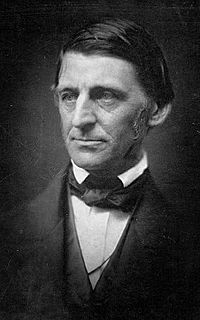 W
WRalph Waldo Emerson, who went by his middle name Waldo, was an American essayist, lecturer, philosopher, and poet who led the transcendentalist movement of the mid-19th century. He was seen as a champion of individualism and a prescient critic of the countervailing pressures of society, and he disseminated his thoughts through dozens of published essays and more than 1,500 public lectures across the United States.
 W
WEnlightenment is the "full comprehension of a situation". The term is commonly used to denote the Age of Enlightenment, but is also used in Western cultures in a religious context. It translates several Buddhist terms and concepts, most notably bodhi, kensho and satori. Related terms from Asian religions are moksha (liberation) in Hinduism, Kevala Jnana in Jainism, and ushta in Zoroastrianism.
 W
WMohandas Karamchand Gandhi, also known as Mahatma Gandhi, was an Indian lawyer, anti-colonial nationalist, and political ethicist, who employed nonviolent resistance to lead the successful campaign for India's independence from British rule, and in turn inspired movements for civil rights and freedom across the world. The honorific Mahātmā, first applied to him in 1914 in South Africa, is now used throughout the world.
 W
WKenneth Grant was an English ceremonial magician and prominent advocate of the Thelemic religion. A poet, novelist, and writer, he founded his own Thelemic organisation, the Typhonian Ordo Templi Orientis—later renamed the Typhonian Order—with his wife Steffi Grant.
 W
WRené-Jean-Marie-Joseph Guénon, also known as ʿAbd al-Wāḥid Yaḥyá [al-Mālikī, al-Ḥāmidī ash-Shādhilī], was a French author and intellectual who remains an influential figure in the domain of metaphysics having written on topics ranging from "sacred science",, to symbolism and initiation.
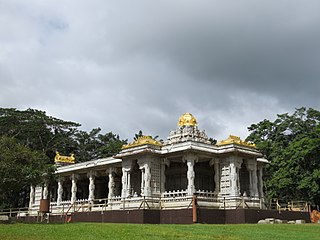 W
WHinduism is a minority religion in the United States of America, ranking fourth largest, and constituting 1% of the population. The vast majority of American Hindus are immigrants from South Asia. There are also Hindus from Southeast Asia, Canada, the Caribbean, Oceania, Africa, Europe, and the Middle East, and other countries and their descendants. Additionally, the United States has number of converts to Hinduism. There are also about 900 ethnic Cham people from Vietnam, one of the few remaining non-Indic Hindus in the world, living in America, 55% of whom are Hindus.
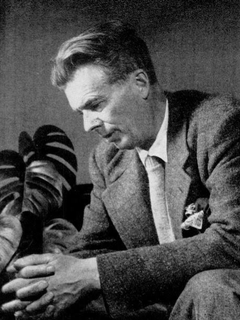 W
WAldous Leonard Huxley was an English writer and philosopher. He wrote nearly fifty books—both novels and non-fiction works—as well as wide-ranging essays, narratives, and poems.
 W
WIndra's Net: Defending Hinduism's Philosophical Unity is a 2014 book by Rajiv Malhotra, an Indian-American author, philanthropist and public speaker, published by HarperCollins.
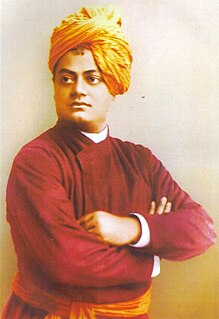 W
WSwami Vivekananda, the nineteenth-century Indian Hindu monk is considered as one of the most influential people of modern India and Hinduism. Rabindranath Tagore suggested to study Vivekananda's works to learn about India. Indian independence activist Subhas Chandra Bose regarded Vivekananda as his spiritual teacher. Mahatma Gandhi said that after reading the works of Vivekananda his love for his nation became a thousand-fold.
 W
WIntegral yoga, also called supramental yoga, is the yoga-based philosophy and practice of Sri Aurobindo and The Mother. Sri Aurobindo finds that there has always been impulse or longings in humans in search for God, Light, Bliss, Freedom, Immortality which has presented itself in a right place in a sequence, which Nature is seeking to evolve beyond mind. This sequence on one end which depicts Life is already involved in Matter and mind in life, leading to the understanding that currently the mind is also a veil of higher states which are beyond mind. Nature via the said impulses would gradually prepare for a higher living and a diviner life.
 W
WKali's Child: The Mystical and the Erotic in the Life and Teachings of Ramakrishna is a book on the Indian mystic Ramakrishna by Hindu studies scholar Jeffrey J. Kripal, published in 1995 by the University of Chicago press. It argues for a homoerotic strain in Ramakrishna's life, rituals, and teachings.
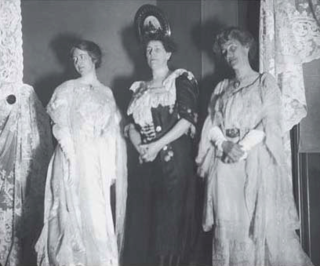 W
WJosephine MacLeod was an American friend and devotee of Swami Vivekananda. She had a strong attachment to India and was an active participant in the Ramakrishna Vivekananda movement. She was given the nicknames "Tantine" and "Jo Jo" by Vivekananda. She considered Swami Vivekananda to be her friend and helped him with his finances. She and Sister Nivedita exchanged letters discussing their positive impressions of Swami Vivekananda and they competed with each other for his attention. Josephine was not a sanyasin, unlike many others such as Sister Nivedita or Sister Christine. She was instrumental in spreading Vivekananda's message on Vedanta in the West. She had many contributions to the initial and the later phases of the development of the order of Ramakrishna and Vivekananda. She was a contributor to many causes espoused by Sister Nivedita, the most famous disciple of Vivekananda, including that of contributing financially towards the development of Indian National Movement esp. in Bengal and elsewhere in India.
 W
WRamana Maharshi was an Indian Hindu sage and jivanmukta. He was born Venkataraman Iyer, but is mostly known by the name Bhagavan Sri Ramana Maharshi.
 W
WIn spirituality, nondualism, also called non-duality, means "not two" or "one undivided without a second". Nondualism primarily refers to a mature state of consciousness, in which the dichotomy of I-other is "transcended", and awareness is described as "centerless" and "without dichotomies". Although this state of consciousness may seem to appear spontaneous, it usually follows prolonged preparation through ascetic or meditative/contemplative practice, which may include ethical injunctions. While the term "nondualism" is derived from Advaita Vedanta, descriptions of nondual consciousness can be found within Hinduism, Buddhism, Sufism and western Christian and neo-Platonic traditions.
 W
WThe Perennial Philosophy is a comparative study of mysticism by the British writer and novelist Aldous Huxley. Its title derives from the theological tradition of perennial philosophy.
 W
WSwami Prabhavananda was an Indian philosopher, monk of the Ramakrishna Order, and religious teacher. He moved to America in 1923, founded the Vedanta Society of Southern California in 1930, and spent the rest of his life there.
 W
WRajneesh, also known as Acharya Rajneesh, Bhagwan Shri Rajneesh, and later as Osho, was an Indian godman, mystic, and founder of the Rajneesh movement.
 W
WRamakrishna mission (RKM) is a Hindu religious and spiritual organisation which forms the core of a worldwide spiritual movement known as the Ramakrishna Movement or the Vedanta Movement. The mission is named after and inspired by the Indian saint Ramakrishna Paramahamsa and founded by Ramakrishna's chief disciple Swami Vivekananda on 1 May 1897. The organisation mainly propagates the Hindu philosophy of Vedanta–Advaita Vedanta and four yogic ideals–jnana, bhakti, karma, and Raja Yoga.
 W
WAnantanand Rambachan is a professor of religion at St. Olaf College.
 W
WRaja Ram Mohan Roy was one of the founders of the Brahmo Sabha, the precursor of the Brahmo Samaj, a social-religious reform movement in the Indian subcontinent. He was given the title of Raja by Akbar II, the Mughal emperor. His influence was apparent in the fields of politics, public administration, education and religion. He was known for his efforts to abolish the practices of sati and child marriage. Raja Ram Mohan Roy is considered to be the "Father of the Bengal Renaissance" by many historians.
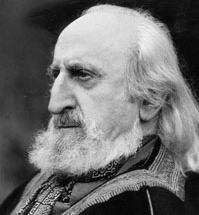 W
WFrithjof Schuon, also known as ʿĪsā Nūr ad-Dīn ʾAḥmad after his conversion to Islam, was an author of German ancestry born in Basel, Switzerland. Schuon is widely recognized as one of the most influential scholars and teachers within the sphere of comparative religion. His religious worldview was influenced by his study of the Hindu philosophy of Advaita Vedanta and Islamic Sufism. He authored numerous books on religion and spirituality as well as being a poet and a painter.
 W
WSir Brajendra Nath Seal was a Bengali Indian humanist philosopher.
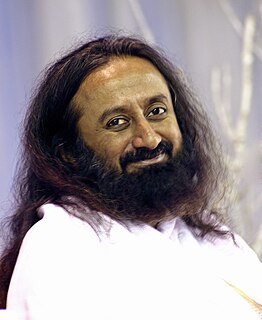 W
WRavi Shankar is an Indian spiritual leader. He is frequently referred to as "Sri Sri" (honorific), Guru ji, or Gurudev. He founded the Art of Living Foundation in 1981, a volunteer-based NGO providing social support to the people. In 1997, he established a Geneva-based charity, the International Association for Human Values, an NGO that engages in relief work and rural development.
 W
WArvind Sharma is the Birks Professor of Comparative Religion at McGill University. Sharma's works focus on Hinduism, philosophy of religion. In editing books his works include Our Religions and Women in World Religions, Feminism in World Religions was selected as a Choaphy ChoiceOutstanding Academic Book (1999).
 W
WSivananda Saraswati was a Hindu spiritual teacher and a proponent of Yoga and Vedanta. Sivananda was born Kuppuswami in Pattamadai, in the Tirunelveli district of Tamil Nadu. He studied medicine and served in British Malaya as a physician for several years before taking up monasticism. He lived most of his life near Muni Ki Reti, Rishikesh.
 W
WSmarta tradition (स्मार्त) is a movement in Hinduism that developed during its classical period around the beginning of the Common Era. It reflects a Hindu synthesis of four philosophical strands: Mimamsa, Advaita, Yoga, and theism. The Smarta tradition rejects theistic sectarianism, and it is notable for the domestic worship of five shrines with five deities, all treated as equal – Shiva, Vishnu, Surya, Ganesha, and Shakti. The Smarta tradition contrasted with the older Shrauta tradition, which was based on elaborate rituals and rites. There has been considerable overlap in the ideas and practices of the Smarta tradition with other significant historic movements within Hinduism, namely Shaivism, Brahmanism, Vaishnavism, and Shaktism.
 W
WUnifying Hinduism: Philosophy and Identity in Indian Intellectual History is a book Andrew J. Nicholson on Indian philosophy, describing the philosophical unification of Hinduism, which it places in the Middle Ages. The book was published in the US in 2010 in hardcover, with a paperback edition appearing in 2014. An Indian hardcover edition was published by Permanent Black in 2011. The book won the 2011 award for Best First Book in the History of Religions from the American Academy of Religion, and has been reviewed in numerous professional journals.
 W
WSwami Vivekananda, born Narendranath Datta, was an Indian Hindu monk. He was a chief disciple of the 19th-century Indian mystic Ramakrishna. He was a key figure in the introduction of the Indian philosophies of Vedanta and Yoga to the Western world, and is credited with raising interfaith awareness, bringing Hinduism to the status of a major world religion during the late 19th century. He was a major force in the revival of Hinduism in India, and contributed to the concept of Indian nationalism as a tool to fight against the British empire in colonial India. Vivekananda founded the Ramakrishna Math and the Ramakrishna Mission. He is perhaps best known for his speech which began with the words "Sisters and brothers of America ...," in which he introduced Hinduism at the Parliament of the World's Religions in Chicago in 1893.
 W
WKenneth Earl Wilber II is an American philosopher and writer on transpersonal psychology and his own integral theory, a systematic philosophy which suggests the synthesis of all human knowledge and experience.